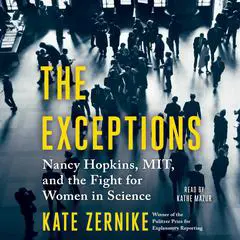 Play Audiobook Sample
Play Audiobook Sample
Boiling Mad: Inside Tea Party America Audiobook
 Play Audiobook Sample
Play Audiobook Sample
Quick Stats About this Audiobook
Total Audiobook Chapters:
Longest Chapter Length:
Shortest Chapter Length:
Average Chapter Length:
Audiobooks by this Author:
Publisher Description
A surprising and revealing look inside the Tea Party movement—where it came from, what it stands for, and what it means for the future of American politics. They burst on the scene at the height of the Great Recession—angry voters gathering by the thousands to rail against bailouts and big government. Evoking the Founding Fathers, they called themselves the Tea Party. Within the year, they had changed the terms of debate in Washington, emboldening Republicans and confounding a new administration's ability to get things done. Boiling Mad is Kate Zernike's eye-opening look inside the Tea Party, introducing us to a cast of unlikely activists and the philosophy that animates them. She shows how the Tea Party movement emerged from an unusual alliance of young Internet-savvy conservatives and older people alarmed at a country they no longer recognize. The movement is the latest manifestation of a long history of conservative discontent in America, breeding on a distrust of government that is older than the nation itself. But the Tea Partiers' grievances are rooted in the present, a response to the election of the nation's first black president and to the far-reaching government intervention that followed the economic crisis of 2008-2009. Though they are better educated and better off than most other Americans, they remain deeply pessimistic about the economy and the direction of the country. Zernike introduces us to the first Tea Partier, a nose-pierced young teacher who lives in Seattle with her fiancé, an Obama supporter. We listen in on what Tea Partiers learn about the Constitution, which they embrace as the backbone of their political philosophy. We see how young conservatives, who model their organization on the Grateful Dead, mobilize a new set of activists several decades their elder. And we watch as suburban mothers, who draw their inspiration from MoveOn and other icons of the Left, plot to upend the Republican Party in a swing district outside Philadelphia. The Tea Party movement has energized a lot of voters, but it has polarized the electorate, too. Agree or disagree, we must understand this movement to understand American politics in 2010 and beyond.
Download and start listening now!
"An interesting look into the world of the Tea Party from a relatively unbiased perspective. It was very informative and gave a voice to the "normal" people of the movement who are often drowned out in the news media."
— Andrew (4 out of 5 stars)
Boiling Mad Listener Reviews
-
" A good basic intro to the emergence of the Tea Party movement. "
— Rob, 11/10/2013 -
" Worth reading to gain insight into the politics and history of the Tea Party and its rise in American Politics and Culture. "
— Sarah, 10/10/2013 -
" This was an interesting enough read, but I hoped it would pierce the surface a bit more. It seemed to never get at the true genesis of the tea party movement, though it did do a good job of humanizing the everyday people behind it. "
— Patrick, 9/8/2013 -
" I read it for research and was thus disapointed at the seeming lu\ack of organization. It feels very jumbled. Other than that, it does a good job of capturing the image of the party. Best point is that in each chapter or subsection its quite smooth reading. "
— Amber, 7/6/2012 -
" Provides abit of understanding what they are thinking and where they came from. Appears that these kind of movement come in times of economic distress and then go away when the economy improves. One can only hope. "
— Dave, 4/20/2012 -
" Provides abit of understanding what they are thinking and where they came from. Appears that these kind of movement come in times of economic distress and then go away when the economy improves. One can only hope. "
— Dave, 1/25/2011 -
" I read it for research and was thus disapointed at the seeming lu\ack of organization. It feels very jumbled. Other than that, it does a good job of capturing the image of the party. Best point is that in each chapter or subsection its quite smooth reading. "
— Amber, 11/19/2010
About Kate Zernike
Kate Zernike is a national correspondent for the New York Times and was a member of the team that shared the 2002 Pulitzer Prize for explanatory reporting. She lives with her family outside New York City.
About Kirsten Potter
Kirsten Potter has won several awards, including more than a dozen AudioFile Earphones Awards and been a three-time finalist for the prestigious Audie Award for best narration. Her work has been recognized by the National Foundation for Advancement in the Arts and by AudioFile magazine, among many others. She graduated with highest honors from Boston University and has performed on stage and in film and television, including roles on Medium, Bones, and Judging Amy.



